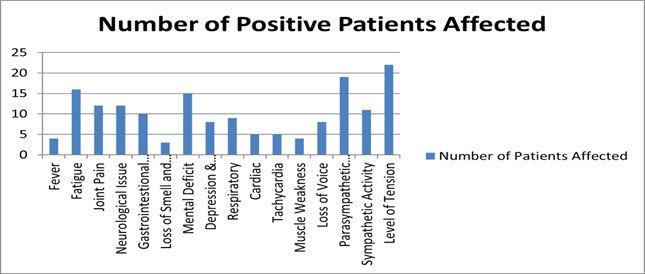Session Information
Session Type: Poster Session B
Session Time: 9:00AM-10:30AM
Background/Purpose: Up to 70% of the 236 million people who have been diagnosed with SARS-CoV-2 develop post-COVID symptoms. (1) This has been defined by the NIH as Long COVID. These individuals present with multiple symptoms and organ involvement. Autonomic nervous system (ANS) dysfunction has been reported as a potential contributor to these complaints. (2) This is the first report of next-generation heart rate variability (HRV).
Methods: Patients with Long-COVID (definitive diagnostic evidence and symptoms for post COVID for a least 3 months) were evaluated in a single COVID clinic in Florida. These patients had multiple symptoms of various types as illustrated in the chart below. ANS function in all patients was measured by a next-generation version of 5-minute resting heart rate HRV predominately used currently to assess ANS function in elite professional athletes. Both 1996 standard time-and frequency-domain (3) and 2002 Bayevsky (4) ANS calculation outputs were assessed (Omegawave Oy, Espoo, Finland).
Results: Fifty-five percent of 40 patients with Long COVID tested (mean age 43 yrs. with a mean symptom duration of 15 months) showed findings of dysautonomia by abnormal resting HRV. Nearly all (97.5%) had combinations of symptoms (mean 5.0 [ range 1-9]) with age trending positive with more symptoms . Tabulated features are noted below. Fatigue (80%), joint pain (45%), dyscognition (72.5%), depression or anxiety (35%) were the predominant symptoms. In the symptomatic group with positive findings of autonomic dysfunction parasympathetic activity was low in 86% of these patients and sympathetic activity was increased in 50% of the patients; the overall level of tension (sympathetic) was abnormal in all these of the noted patients.
Conclusion: Long COVID is a complex complication of acute COVID infection and because of their multisystem presentation many of these patients are finding themselves being evaluated by rheumatologists. In many ways, the multi-system presentation, the abnormality in immunologic function and cytokine activity is comparable to the presentation of autoimmune diseases commonly seen by rheumatologists. We report autonomic dysregulation documented by next-generation HRV is a prominent finding of this patient population and may offer a novel explanation for Long COVID and allow us to eventually understand and treat this often very debilitating disorder.
References:
1. Lancet Respir Med. 2021 Nov;9(11):1275-1287. doi: 10.1016/S2213-2600(21)00383-0. Epub 2021 Oct 7.
2. Clin Med (Lond). 2021 Jan;21(1):e63-e67. doi: 10.7861/clinmed.2020-0896. Epub 2020 Nov26. PMID: 33243837; PMCID: PMC7850225.
3. Eur Heart J. 1996 Mar;17(3): 354-81.
4. Bayevsky RM, Ivanov GG, Chireykin GG, et al. HRV Analysis under the usage of different electrocardiography systems prepared according to the order of the Committee of Clinic Diagnostic Apparatus and the Committee of New Medical Techniques of Ministry of Health of Russia (protocol №4 from the 11APR2002).
To cite this abstract in AMA style:
Gaylis N, DeLaRosa O, Polissar N, Miljacic N, Holman A. Autonomic Nervous System Dysfunction Common Among Patients with Long COVID: An Exploratory Evaluation [abstract]. Arthritis Rheumatol. 2022; 74 (suppl 9). https://acrabstracts.org/abstract/autonomic-nervous-system-dysfunction-common-among-patients-with-long-covid-an-exploratory-evaluation/. Accessed .« Back to ACR Convergence 2022
ACR Meeting Abstracts - https://acrabstracts.org/abstract/autonomic-nervous-system-dysfunction-common-among-patients-with-long-covid-an-exploratory-evaluation/

